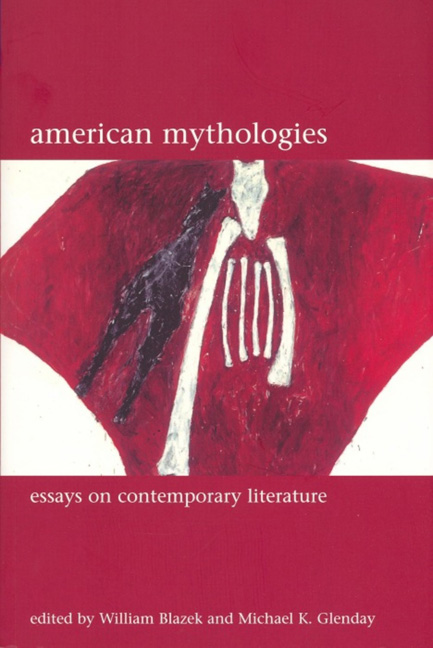Book contents
- Frontmatter
- Dedication
- Contents
- Acknowledgements
- Introduction
- 1 Indians with Voices: Revisiting Savagism and Civilization
- 2 Wild Hope: Love, Money and Mythic Identity in the Novels of Louise Erdrich
- 3 Float Like a Butterfly, Sting Like a Bee: Mythologies of Representation in Selected Writings on Boxing by Norman Mailer
- 4 The Secret Sharing: Myth and Memory in the Writing of Jayne Anne Phillips
- 5 The Individual's Ghost: Towards a New Mythology of the Postmodern
- 6 ‘Cheap, On Sale, American Dream': Contemporary Asian American Women Writers’ Responses to American Success Mythologies
- 7 ‘No Way Back Forever’: American Western Myth in Cormac McCarthy's Border Trilogy
- 8 Native American Visions of Apocalypse: Prophecy and Protest in the Fiction of Leslie Marmon Silko and Gerald Vizenor
- 9 The Brave New World of Computing in Post-war American Science Fiction
- 10 Mythologies of ‘Ecstatic immersion’: America, The Poem and the Ethics of Lyric in Jorie Graham and Lisa Jarnot
- 11 Whose Myth is it Anyway? Coyote in the Poetry of Gary Snyder and Simon J. Ortiz
- 12 Aging, Anxious and Apocalyptic: Baseball's Myths for the Millennium
- 13 Finding a Voice, Telling a Story: Constructing Communal Identity in Contemporary American Women's Writing
- Notes on Contributors
- Index
2 - Wild Hope: Love, Money and Mythic Identity in the Novels of Louise Erdrich
- Frontmatter
- Dedication
- Contents
- Acknowledgements
- Introduction
- 1 Indians with Voices: Revisiting Savagism and Civilization
- 2 Wild Hope: Love, Money and Mythic Identity in the Novels of Louise Erdrich
- 3 Float Like a Butterfly, Sting Like a Bee: Mythologies of Representation in Selected Writings on Boxing by Norman Mailer
- 4 The Secret Sharing: Myth and Memory in the Writing of Jayne Anne Phillips
- 5 The Individual's Ghost: Towards a New Mythology of the Postmodern
- 6 ‘Cheap, On Sale, American Dream': Contemporary Asian American Women Writers’ Responses to American Success Mythologies
- 7 ‘No Way Back Forever’: American Western Myth in Cormac McCarthy's Border Trilogy
- 8 Native American Visions of Apocalypse: Prophecy and Protest in the Fiction of Leslie Marmon Silko and Gerald Vizenor
- 9 The Brave New World of Computing in Post-war American Science Fiction
- 10 Mythologies of ‘Ecstatic immersion’: America, The Poem and the Ethics of Lyric in Jorie Graham and Lisa Jarnot
- 11 Whose Myth is it Anyway? Coyote in the Poetry of Gary Snyder and Simon J. Ortiz
- 12 Aging, Anxious and Apocalyptic: Baseball's Myths for the Millennium
- 13 Finding a Voice, Telling a Story: Constructing Communal Identity in Contemporary American Women's Writing
- Notes on Contributors
- Index
Summary
A Critical Overview: Transcultural Writing
The importance of Ojibwe foundational myths in Louise Erdrich's eight novels of what might still be called the ‘Love Medicine’ series has been interpreted by critics with an increasing confidence and complexity that parallels the fiction's own development. I first want to review a few salient features of this criticism in order to show how it might be used to further examine the relationship between traditional and contemporary North American myth within the novels, especially The Bingo Palace (1994) and Tales of Burning Love (1996). Besides providing insights into both the traditional mythic sources of Erdrich's stories and the direction of criticism about ethnic American literature, the critical texts often aim to consider the contemporary political or social dimensions of Erdrich's narrative forms and strategies. A particular theme arising from such discussions – that of transformation and cultural redefinition – serves as the focus for my own consideration of syncretic identity in the novel series. Erdrich's use of traditional and contemporary Native American experience to explore modern identity as a web of personal, community, and mytho-historic strands is most often emphasized in the criticism; but less often addressed is the author's delineation of such ‘classic’ Euro-American myths as the American Dream of economic prosperity, the machine and technology as the means of exploiting new frontiers, and the road as symbol of escape and discovery. Even a brief foray into such territory should reveal the need for balanced investigation of Erdrich's work as a dialogue between Native American and Euro-American history and myth as it lives in the present and looks to the future.
It is tempting to conclude that Louise Erdrich's empathy for her fictional characters was temporarily extended to her literary critics when the publication in 1998 of The Antelope Wife introduced a new set of characters and thus by implication seemed to have brought the Love Medicine series finally to an end after five novels. With little indication of regret or relief, scholars soon took the opportunity to consolidate a body of criticism, most readily seen in three volumes published between 1999 and 2000: A Reader's Guide to the Novels of Louise Erdrich, and two collections of essays – The Chippewa Landscape of Louise Erdrich and Louise Erdrich's ‘Love Medicine’: A Casebook.
- Type
- Chapter
- Information
- American MythologiesNew Essays on Contemporary Literature, pp. 29 - 46Publisher: Liverpool University PressPrint publication year: 2005



